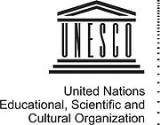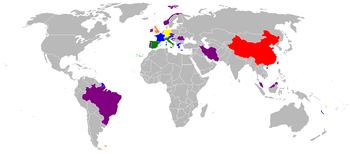
International Network of Geoparks
Encyclopedia
The Global Geoparks Network (GGN) (also known as the Global Network of National Geoparks) is a UNESCO
programme established in 1998. Managed under the body’s Ecological and Earth Sciences Division, the GGN seeks the promotion and conservation of the planet’s geological heritage, as well as encourages the sustainable research and development by the concerned communities.

The international network seeks the membership of geological parks, or geopark
s—geographical areas where geological heritage is the focus of local protection, education and development.
A set of criteria as established by UNESCO must first be met for a geopark, as nominated by the corresponding government, to be included in the GGN:
Criteria satisfaction is evaluated during biennial meetings (every even year) by the Geoparks Committee, known as the International Conference on Geoparks, which is also in charge with the periodic review of projects related to geological awareness. The first members of the GGN were named during the first conference in 2004, and it has continued to grow since then:
The GGN works in close synergy with another project under UNESCO’s Ecological and Earth Sciences Division—the Man and Biosphere (MAB) World Network of Biosphere Reserves
—to come up with and establish different means of sustainable development in promoting the local communities’ relationship with the natural environment.
To date, 58 geoparks from 18 countries have been included in the GGN. It is hoped that over 500 Geoparks will eventually be part of the GGN.
UNESCO
The United Nations Educational, Scientific and Cultural Organization is a specialized agency of the United Nations...
programme established in 1998. Managed under the body’s Ecological and Earth Sciences Division, the GGN seeks the promotion and conservation of the planet’s geological heritage, as well as encourages the sustainable research and development by the concerned communities.
The network

The international network seeks the membership of geological parks, or geopark
Geopark
A Geopark is defined by the United Nations Educational, Scientific and Cultural Organization in its UNESCO Geoparks International Network of Geoparks programme as follows:...
s—geographical areas where geological heritage is the focus of local protection, education and development.
A set of criteria as established by UNESCO must first be met for a geopark, as nominated by the corresponding government, to be included in the GGN:
- the existence of a management plan designed to foster socio-economic development that is sustainable (most likely to be based on agritourismAgritourismAgritourism, as it is defined most broadly, involves any agriculturally-based operation or activity that brings visitors to a farm or ranch. Agritourism has different definitions in different parts of the world, and sometimes refers specifically to farm stays, as in Italy...
and geotourismGeotourismGeotourism is "best practice" tourism that sustains, or even enhances, the geographical character of a place, such as its culture, environment, heritage, and the well-being of its residents....
); - demonstrate methods for conserving and enhancing geological heritage and provide means for teaching geoscientific disciplines and broader environmental issues;
- joint-proposals submitted by public authorities, local communities and private interests acting together, which demonstrate the best practices with respect to Earth heritage conservation and its integration into sustainable development strategies
Criteria satisfaction is evaluated during biennial meetings (every even year) by the Geoparks Committee, known as the International Conference on Geoparks, which is also in charge with the periodic review of projects related to geological awareness. The first members of the GGN were named during the first conference in 2004, and it has continued to grow since then:
| Session | Year | Site | Date |
|---|---|---|---|
| 1st | 2004 | Beijing Beijing Beijing , also known as Peking , is the capital of the People's Republic of China and one of the most populous cities in the world, with a population of 19,612,368 as of 2010. The city is the country's political, cultural, and educational center, and home to the headquarters for most of China's... , China People's Republic of China China , officially the People's Republic of China , is the most populous country in the world, with over 1.3 billion citizens. Located in East Asia, the country covers approximately 9.6 million square kilometres... |
June 27–July 7 |
| 2nd | 2006 | Belfast Belfast Belfast is the capital of and largest city in Northern Ireland. By population, it is the 14th biggest city in the United Kingdom and second biggest on the island of Ireland . It is the seat of the devolved government and legislative Northern Ireland Assembly... , United Kingdom United Kingdom The United Kingdom of Great Britain and Northern IrelandIn the United Kingdom and Dependencies, other languages have been officially recognised as legitimate autochthonous languages under the European Charter for Regional or Minority Languages... |
September 17–21 |
| 3rd | 2008 | Osnabrück Osnabrück Osnabrück is a city in Lower Saxony, Germany, some 80 km NNE of Dortmund, 45 km NE of Münster, and some 100 km due west of Hanover. It lies in a valley penned between the Wiehen Hills and the northern tip of the Teutoburg Forest... , Germany Germany Germany , officially the Federal Republic of Germany , is a federal parliamentary republic in Europe. The country consists of 16 states while the capital and largest city is Berlin. Germany covers an area of 357,021 km2 and has a largely temperate seasonal climate... |
June 22–26 |
| 4th | 2010 | Langkawi, Malaysia | April 12–16 |
The GGN works in close synergy with another project under UNESCO’s Ecological and Earth Sciences Division—the Man and Biosphere (MAB) World Network of Biosphere Reserves
World Network of Biosphere Reserves
The UNESCO World Network of Biosphere Reserves covers internationally-designated protected areas, known as biosphere reserves, that are meant to demonstrate a balanced relationship between man and nature The UNESCO World Network of Biosphere Reserves covers internationally-designated protected...
—to come up with and establish different means of sustainable development in promoting the local communities’ relationship with the natural environment.
To date, 58 geoparks from 18 countries have been included in the GGN. It is hoped that over 500 Geoparks will eventually be part of the GGN.
See also
- United Nations Environment ProgrammeUnited Nations Environment ProgrammeThe United Nations Environment Programme coordinates United Nations environmental activities, assisting developing countries in implementing environmentally sound policies and practices. It was founded as a result of the United Nations Conference on the Human Environment in June 1972 and has its...
- World Heritage SiteWorld Heritage SiteA UNESCO World Heritage Site is a place that is listed by the UNESCO as of special cultural or physical significance...
- National parkNational parkA national park is a reserve of natural, semi-natural, or developed land that a sovereign state declares or owns. Although individual nations designate their own national parks differently A national park is a reserve of natural, semi-natural, or developed land that a sovereign state declares or...
- Geological Survey of IndiaGeological Survey of IndiaGeological Survey of India , established in 1851 is a government organization in India which is an attached office to the Ministry of Mines of Union Government of India for conducting geological surveys and studies. It is one of the oldest of such organizations in the world and the second oldest...
(GSI) also maintains 2 fossil parks currently. - Fossil parkFossil parkA fossil park is a protected area with rich deposits of fossils. Fossil parks may be used in educating the public, and there are many fossil parks all over the world.-See also:* Paleorrota* List of Fossil Parks* Fossils* Fossil Hunters* Rockhounding...
External links
- List of GGN Geoparks
- International Union of Geological Sciences — Minutes of the 46th Executive Committee Meeting, Cairo, Egypt, January 26–30, 2000.
- International Union of Geological Sciences — 45th Executive Committee Meeting, Vienna, Austria, January 26–30, 1998.

